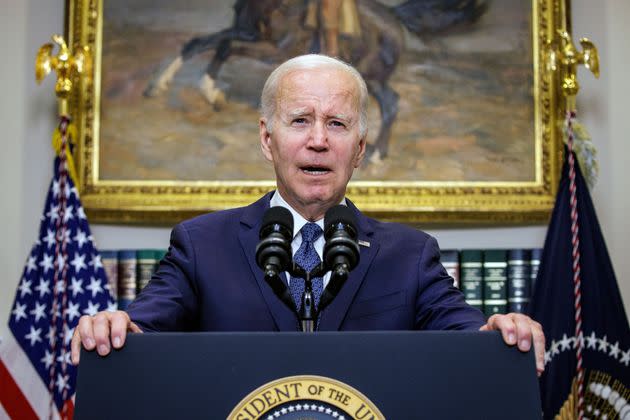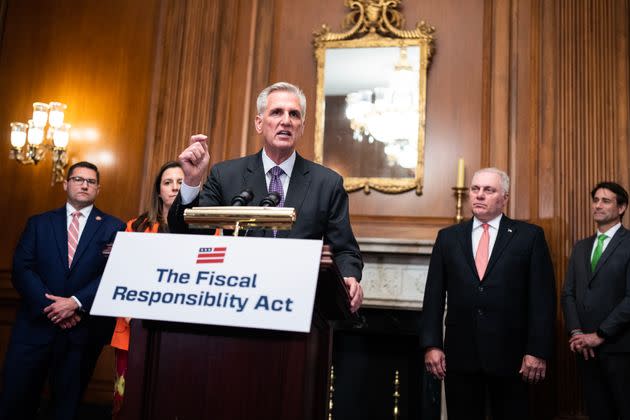The US May Have Just Avoided Financial Meltdown. Here's Why That Matters To The UK

US President Joe Biden managed to reach a deal with Republican House Speaker Kevin McCarthy to manage the country's debt crisis – and it was just voted through the House.
The US government was on the cusp of running out of money when it agreed to a deal which should narrowly avoid international financial chaos on Wednesday.
Shortly before the US was expected to run out of money altogether (around June 5), US president Joe Biden and Republican House Speaker Kevin McCarthy presented their agreement to cope with the country’s debt crisis to the House of Representatives.
Luckily, it passed, and is now moving up through Congress before potentially passing into law.
But what does all this mean – and how does it affect the UK?
What is the debt crisis in the US?
In simple terms, the US government spends more money than it makes, which is why it is in so much debt.
It needs to spend more to pay for federal employees, the military, social security, medicare, interest on national debt and tax refunds.
As these payments are continuous, the US Congress has to sporadically vote to alter the borrowing ceiling so that they can keep up.
The polarisation of the Democrats and the Republicans in recent years means getting all lawmakers to agree to extend the debt ceiling is getting harder.
The US’s current debt ceiling (the cap on its debt) stands at a whopping £25 trillion ($31.4 trillion). That limit was exceeded back in January, so the Treasury had to use “extraordinary measures” to cope in the meantime – but time was running out.
Treasury Secretary Janet Yellen had previously warned that more borrowing was needed otherwise the US would not have enough money to meet all of its financial obligations as soon as June 5 and so it would default.

Speaker of the House Kevin McCarthy, conducts a news conference after the House passed the Fiscal Responsibility Act, which will raise the debt limit on Wednesday, May 31, 2023.
Why is defaulting a big deal?
This happens if the required interest or repayments on a debt are not made – and aside from an accidental (and temporary) default in 1979, it’s never happened in the US before.
But, experts are still pretty sure it would push the country into recession.
It would mean no one in the US government would get paid, companies and charities reliant on government funds would be stuck, social security payments would cease and financial markets would go into freefall.
For context, more than £400billion ($500billion) in US debt is traded across the financial system every day.
Investors would likely then lose confidence in the country’s ability to pay interest on its debt (Treasury bonds). As this is a government payment, it is usually seen as a safe bet to store money – so to jeopardise that undermines the stability of the government itself.
If investors see US debt as risky its credit rating would go up, they will then charge the US more to borrow money, meaning interest across the country will also increase.
What would that mean for the UK?
The US is the world’s largest economy, so it would have major impacts for the rest of the world if it were to default.
Other investors may fear that other countries could follow suit, and ask to be paid more to lend to other nations.
Writing for Sky News, Ian King speculated: “It is difficult to say what the impact of all this would be for the UK but, when the US has historically slipped into recession, the UK has tended to follow a few months later. So I would expect UK house prices to fall under such a scenario.
“I’d certainly expect the UK stock market to fall as well. All of which would probably push the Bank of England into cutting interest rates.”
The UK is already facing a cost of living crisis, with food inflation still at 19.1% – it’s not clear what impact any additional pressures could have, especially as the war in Ukraine already saw European energy bills skyrocket.
How did the US just avert a financial crisis?
The House of Representatives just passed a bill which would suspend the government’s borrowing limit entirely until 2025.
That would prevent a default on US debt repayments, and allow the federal government to borrow more money until after the November 2024 presidential election.
This has Biden’s backing, but still needs to get through the Senate on Friday before it can be passed into law.
There was a risk this time that the two sides of Congress would not be able to agree to the terms of a deal to manage the debt.
Republicans have seen it as an opportunity to push their own agenda, wanting to curb government spending, while Democrats think raising the debt limit is necessary to run government.
But, in the end, it was a compromise.
The final House vote was 314 to 117 – Republican house speaker Kevin McCarthy said the Congress “all made history” by voting it through.
Joe Biden said: “This budget agreement is a bipartisan compromise. Neither side got everything it wanted. I have been clear that the only path forward is a bipartisan compromise that can earn the support of both parties. This agreement meets that test.”
The deal means there’s a freeze on all non-defence budgets in 2024, with just a 1% rise the next year and no budget caps after 2025.

 Yahoo Sport
Yahoo Sport 





































